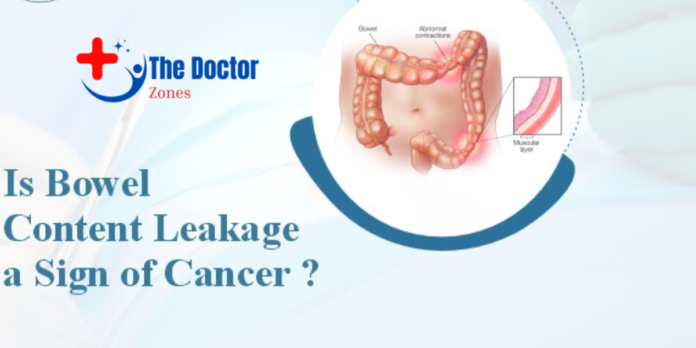Is Bowel Leakage a Sign of Cancer: Bowel leakage causes
Fecal incontinence, often known as bowel leaking, can be unpleasant. A loss of control happens to many people occasionally, particularly when they have a gastrointestinal ailment. Nonetheless, you might be concerned about the cause and potential cancerous implications of intestinal leakage which is ongoing or recurrent.
Bowel leaks can be caused by a variety of disorders, most of which are curable. However, you should consult a doctor if your bowel leaks don’t appear to be related to a passing stomach ailment or anything you’ve eaten. Bowel leaks can be an indication of cancer and other serious illnesses. Read more articles: Do Takis Cause Cancer
Bowel Leakage: Understanding the Connection to Cancer
Bowel leakage, also known as fecal incontinence, is a condition that affects many individuals and raises significant concern, especially when associated with serious health issues like cancer. While bowel leakage is not typically a direct sign of cancer, it’s crucial to understand the potential connections and other underlying causes to address this distressing symptom effectively.
What is Bowel Leakage?

Bowel leakage is characterized by the involuntary release of fecal matter. This can range from occasional leakage when passing gas to complete loss of bowel control. Bowel incontinence can be caused by various factors including muscle or nerve damage, certain diseases, or the aftermath of surgery.
Common Causes of Bowel Leakage
Bowel leakage causes can be broadly categorized into structural and functional abnormalities, infections, medications, and other conditions. Common causes include:
- Anal leakage after bowel movement due to diminished sphincter control.
- Chronic conditions like diabetes mellitus and irritable bowel syndrome.
- Anal leakage causes such as rectal prolapse or spinal cord injuries.
- Gastrointestinal infections and inflammatory bowel disease.
- Side effects of medications, including laxatives and antidepressants.
Relationship Between Bowel Leakage and Cancer
Bowel leakage itself is not exclusively a symptom of cancer, but there is a cancer and bowel leakage connection that warrants attention. Persistent bowel leakage should be evaluated by a healthcare professional to rule out serious conditions, including various cancers.
Symptoms Indicating a Possible Cancer Connection
Cancer-related bowel symptoms often overlap with other gastrointestinal issues. Key colorectal cancer indicators include:
- Changes in bowel habits such as persistent diarrhea or constipation.
- Blood in or on the stool, which are woman signs of colon cancer in stool.
- Abdominal pain, aches, or cramps.
- Unexplained weight loss and fatigue.
Signs of Colorectal and Other Gastrointestinal Cancers

Symptoms of bowel cancer in a woman may include:
- Persistent bowel leakage alongside changes in bowel movements.
- Gastrointestinal cancer symptoms like difficulty swallowing, heartburn, and abdominal swelling.
- Blood in stool, often a major colon cancer sign.
- Urinary incontinence and bladder control issues can also indicate underlying problems.
Diagnostic Procedures and Early Detection
Early detection is crucial in managing cancer. Colonoscopy is a key diagnostic procedure for identifying bowel cancer symptoms woman. This test can detect colon cancer signs and other abnormalities in the bowel. Understanding bowel cancer signs and seeking timely medical advice can significantly impact treatment outcomes.
Treatment Options for Bowel Leakage
Fecal incontinence treatment varies depending on the underlying cause. Options may include:
- Dietary adjustments to manage symptoms.
- Medications to control diarrhea or constipation.
- Pelvic floor exercises and biofeedback to strengthen rectal muscles.
- Surgical interventions in severe cases.
Addressing Bowel Health and Preventive Measures
Maintaining good bowel health is essential for preventing and managing bowel leakage. This includes a balanced diet rich in fiber, regular exercise, and avoiding known irritants such as caffeine and alcohol. Understanding what causes colon cancer can help mitigate risks, such as a high-fat diet and a sedentary lifestyle.
Emotional and Psychological Impact
Bowel leakage can have significant emotional and psychological impacts. It’s essential to seek support and address these issues alongside medical treatment. Patient stories and support groups can provide valuable insights and encouragement.
Conclusion
Bowel leakage is a complex condition with various causes, including potential links to cancer. Understanding the cancer risk and bowel leakage connection is crucial for early detection and treatment. If you experience persistent bowel leakage, consult with a healthcare provider to determine the cause and appropriate treatment. Early intervention can improve quality of life and address serious health concerns effectively.
FAQs About Bowel Leakage and Cancer
- Is bowel leakage a sign of cancer? While it can be associated with cancer, most cases are due to less serious conditions.
- What are the early signs of bowel cancer? Look for changes in bowel habits, blood in the stool, and unexplained weight loss.
- Is colon cancer painful? Pain is not always present in early stages, making early detection vital.
- Can bowel leakage be treated? Yes, with the right diagnosis, many cases of bowel leakage can be effectively managed.








